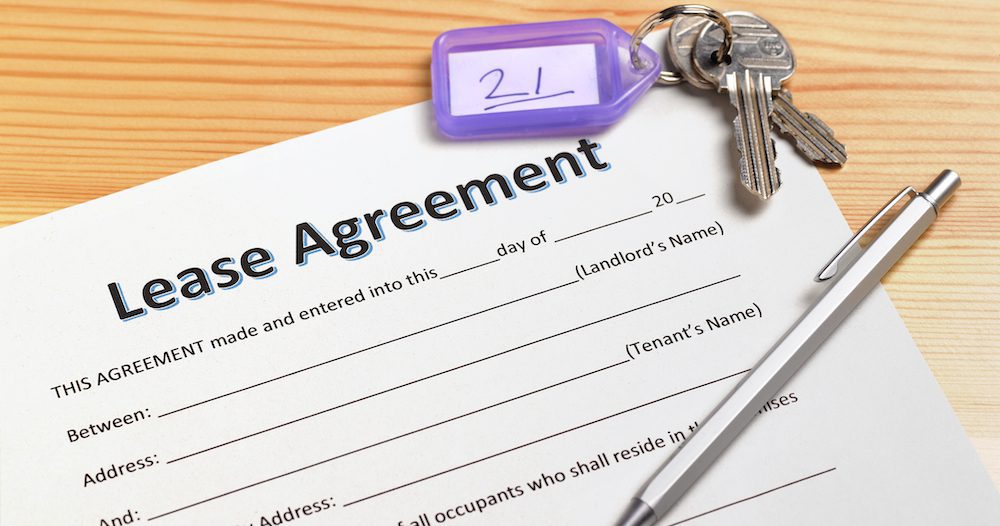5 Crucial Questions To Ask Before You Renew Your Rental Lease Right Now
Is your lease almost up? Before you renew your rental contract for another year, there are numerous questions you should consider, particularly in the era of COVID-19.
While signing a new lease should never be done without pondering your current circumstances, the coronavirus pandemic has made it all the more crucial to weigh your options first. After all, COVID-19 may have changed many things about how you live and work—and how well your current space and location suit your needs.
So before you sign on that dotted line of a new lease, consider these questions first to make sure it’s the right decision for you.
1. Can I still afford this rental?
The first and most important question to ask relates to your current financial situation. Are you fearing a layoff or pay cut? Or worse, have you already experienced it? If so, it may be time to consider downsizing to a less expensive rental, or negotiate with your current landlord for a rent reduction. You might be surprised by how accommodating your landlord is right now.
“Landlords are in serious competition for quality renters now,” says Justin Pogue, a residential property manager for nearly 20 years. “With millions unemployed, the pool of qualified renters has shrunk, which may give you the ability to negotiate.”
If you like your apartment but can’t afford it anymore, take a price survey of other apartment communities that meet your livability criteria before your lease is up, says Pogue. “If you find a better deal, ask your landlord to match it.”
Just make sure you’ve done your research first.
“Tenants should only renegotiate their rates after finding another comparable, but cheaper unit,” says Berk Cagatay, an apartment rental manager in Los Angeles. “It’s a good strategy for the renters who want to lock in a low rate before the economy picks back up.”
And if your landlord won’t budge, you may just want to move to less expensive digs.
2. Should I look for a roommate?
If you’re dogged by financial concerns, one of the easiest ways to control monthly expenses is by splitting them. Unless there’s a significant other in the picture, you may want to consider finding a trustworthy roommate or two. They can help you make ends meet, and provide some company in these isolating times.
“You may have dismissed the possibility before, but after living in the solitary confinement of lockdown, having the right roommate just might be more appealing now,” points out Pogue.
Just make sure to clear such a change in your living arrangements with your landlord so this can be reflected in your new lease.
3. Should I negotiate for lower rent where I am, even if I can afford it?
Even if your finances aren’t in jeopardy, negotiating for lower rent is still a smart option if you feel there are better deals to be had out there—or if you’re no longer able to use many of the amenities you once enjoyed, like the building gym or community swimming pool.
“Reach out, and ask for what you want. The worst they can say is no. And in that case, you’re no worse off than when you started,” says Seth Rouch, a landlord in Aurora, CO. In fact, he’d just offered one tenant a monthly discount of $300, totaling $3,600 for the year.
“I did this because they are great tenants,” he explains. “Landlords often confuse themselves, thinking their building is the asset. However, the truth is the tenant is the asset. Without a tenant, I just have an extra house payment.”
4. Does my rental still meet my space needs?
Though cities across the U.S. have slowly opened up, many people are still cooped up at home, either working virtually or home-schooling children. With that in mind, rental units have transformed from places to eat, sleep, and relax to doubling as offices, classrooms, and entertainment areas.
“One of the first questions I would ask is, ‘If I’m working or home-schooling kids from home now, does this rental meet those needs and space requirements?’” says Rob Carrillo, a property manager with Century 21 Haggerty in El Paso, TX.
It’s also worth pondering whether your apartment is conducive to being in quarantine. By that, think about your comfort level inside the space itself for long periods of time and in the surrounding neighborhood.
“Are you in an area where you want to live if you encounter a serious health issue or other crisis?” asks Chris Gold, CEO of Chris Buys Homes in St. Louis. “This virus may stick around for a while, and people should plan for it. Maybe you’d like to be closer to family or emergency services? Or maybe you’d like to get out of the city to live in a place where you are not directly in contact with people on a regular basis?”
5. Should I buy a home instead of renting?
There are numerous reasons why someone may choose to rent instead of buy. However, with interest rates hovering at all-time lows, renters may be surprised to find out they can often save money in the long run if they buy instead of rent.
“I understand down payments may be difficult for some people to come up with,” says Mike Zschunke, a real estate agent in Arizona. “However, it doesn’t hurt to call a mortgage broker to review your current situation. You may realize your situation is different than you initially thought.”
“Always evaluate the opportunity cost of renting versus buying,” adds Michael Chadwick, a licensed real estate salesperson with the Corcoran Group in New York City. “If you are at least four to six months from when your lease expires, and you have the means to buy, consider if you want to continue to dump thousands of dollars into rent when you could be investing in yourself. Despite every crisis in the past 30 or 40 years, home prices on average always rise. You have to play the long game.”
Not sure whether renting or buying is right for you? Use an online rent vs. buy calculator to see what’s cheaper in your area, or check out a home affordability calculator, which helps estimate how much you can afford to spend on a home and monthly mortgage payments.
The post 5 Crucial Questions To Ask Before You Renew Your Rental Lease Right Now appeared first on Real Estate News & Insights | realtor.com®.
Homebuyers: For access to all listings and to find a homebuyers real estate agent that will represent only your interests call 800-935-6222 or click the button below to connect with MABA. At MABA we got you!

FIRST TIME HOMEBUYERS
First Time Home Buying in Massachusetts
 MABA Buyer Agents help first time home buyers reduce the stress and frustration normally associated with buying a home or condo – especially for first time home buyers.
MABA Buyer Agents help first time home buyers reduce the stress and frustration normally associated with buying a home or condo – especially for first time home buyers.
As a first time homebuyer in Massachusetts, you can turn to our non-profit organization to help you understand and navigate the complexities of the entire Massachusetts real estate transaction, from mortgage pre-approval until you are handed the keys to your new home or condominium. Each of our member buyer's brokers and agents works only for their buyer-clients and never for the seller of the home or condo that their buyers want to buy.
MABA Buyer Agents will take the time to learn about you and your real estate goals, help you understand your options, including first time home buyer programs, properties and/or condominium associations, estimate real property values and put together a negotiating strategy to help you increase the odds of getting your offer accepted in our competitive Massachusetts real estate market. After advocating to get your offer accepted, your MABA buyer's agent will be there for you at your home inspection and help you protect your deposit through the inspection, purchase & sale and financing contingency periods.
You can buy your first home or condo with confidence knowing that your MABA buyer agent is committed to saving you time and money and helping you make your best home buying decision.
Tags used in this Real Estate Homebuyer in Massachusetts blog post:
#HomeBuyers #BuyersAgent #Boston #ma #RealEstate #HomeBuying #Broker #home #homesforsale
Article From: "Clarissa Buch" Read full article
Get Started with MABA
For no extra cost, let a MABA buyer agent protect your interests



